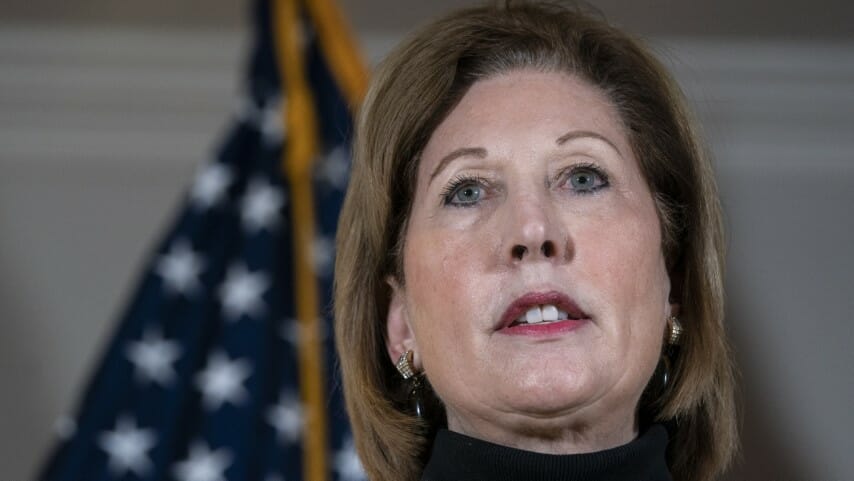With Suspension of Sidney Powell, Twitter Is Establishing Precedent to Potentially Ban Trump From its Platform
Photo via Getty Images, Drew Angerer
Imagine this scenario: The date is Jan. 20, 2021. Inauguration Day. After winning the 2020 Presidential election, Joe Biden is sworn in and officially becomes the 46th President of the United States. The world breathes a collective sigh of relief, and even though we’ll still face the challenge of ending a deadly, ongoing global pandemic, the state of our democracy at least seems to have been saved from the clutches of those who would tear it apart entirely.
Meanwhile, the outgoing 45th President of the United States is huddled in a bunker somewhere, or vacationing at Mar-a-Lago. Incensed by TV coverage of Biden’s inauguration, he flies into one of his classic Twitter tirades, the kind we’ve seen practically every day since the beginning of the election on Nov. 3. The now-former President reiterates the same tired, baseless, conspiracy laden theories of electoral fraud he’s been pushing, and links to any garbage site on the web that might stoke his ego.
And then Twitter suspends Donald Trump’s account. Furious, he lashes out even more as soon as the suspension ends. And then Twitter bans Donald Trump from its platform entirely.
This scenario is not only possible, but is looking entirely likely according to experts in media law. Twitter as a company currently seems to be establishing the exact precedent for how they’ll begin treating Trump the moment he becomes a private citizen once again, rather than the “leader of the free world.” The last 24 hours, in fact, have provided a textbook example of how the company could cut Trump off from his nearly 89 million Twitter followers in response to his constant abuse of the site’s rules and policies.
This process of Twitter deciding to stand up to Trump began in the days leading up to the election, as the platform was increasingly willing to fact-check the sitting President on absurd claims that were clearly intended to shake the faith of voters in our democratic institutions. The phrase “this claim is disputed by official sources” became a meme in and of itself for the fact that it so often appeared on Trump posts claiming (without evidence) that election fraud would be/had been widespread and substantial. Trump and his lawyers have of course never been able to prove any of their claims, leading to the Trump campaign’s biggest cases being dismissed with prejudice in federal courts.
Other than politics, how do you lose a case where large numbers of voters, far more than you need to flip Pennsylvania, are disenfranchised? Vote Observers thrown out of counting rooms. People going to vote finding out they have already voted through a fake ballot – go home!
— Donald J. Trump (@realDonaldTrump) November 22, 2020
Trump’s own Twitter account, though, has benefitted from the shield of its official status—although their posts can receive fact checking and warnings about deceptive information, Twitter will not outright suspend or ban those accounts of high-ranking elected officials. A Twitter spokesperson put it this way in a statement to Newsweek: “Twitter’s approach to world leaders, candidates, and public officials is based on the principle that people should be able to choose to see what their leaders are saying with clear context. This means that we may apply warnings and labels, and limit engagement to certain tweets. This policy framework applies to current world leaders and candidates for office, and not private citizens when they no longer hold these positions.”
Which is to say, once Trump is no longer the POTUS, his invulnerability to suspensions and bans will immediately expire. After Jan. 20, 2021, he’ll actually be made to answer for whatever he’s tweeting at any given time, and it seems doubtful that he’ll suddenly start reining in his embrace of dangerous misinformation and conspiracy theories.
Case in point: Yesterday’s incredibly embarrassing, deeply amusing drama with now-former Trump legal team member Sidney Powell. Everything that happened with Sidney Powell and Twitter yesterday provides a framework for exactly how the company is likely to treat Trump as he leaves office.
If you don’t know Sidney Powell, she’s an American attorney who before the 2020 election was best known for representing Trump crony General Michael Flynn. She’s also a proponent of QAnon conspiracy theories, likely recognizing that she can profit off deluded conspiracy theorists who will help raise her public profile and buy whatever book about the election she’ll no doubt publish in coming months. Weeks ago, Trump announced that Powell was part of his “elite strike force” team of lawyers making baseless election fraud claims, also including the likes of Rudy Giuliani and Jenna Ellis. In a now-deleted tweet, he makes her status as a member of the team quite clear. Keep in mind, this is less than 10 days ago.
